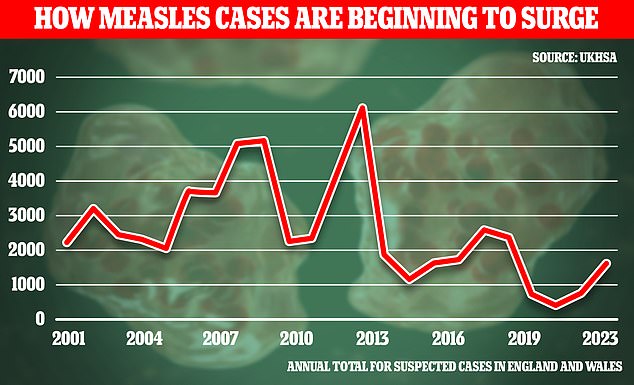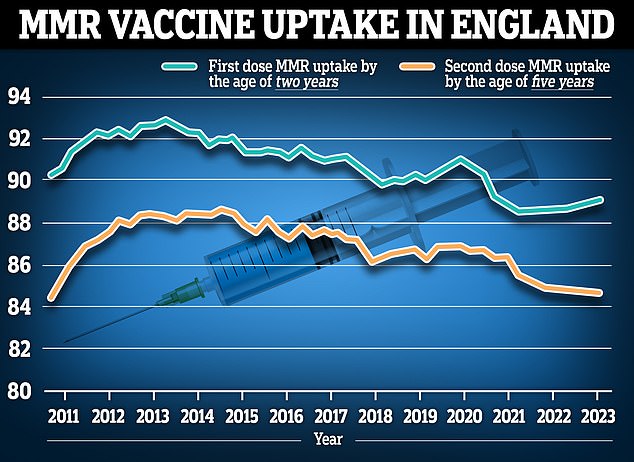British child dies from brain swelling caused by measles – is your region a hotspot for the deadly virus?
Health authorities are scrambling to contain an alarming measles outbreak in England after a child was confirmed dead.
In 2024, more than 2,000 cases have already been recorded, the largest outbreak in more than a decade.
But only half of children in parts of London have had both doses of the measles, mumps and rubella (MMR) vaccine, which is said to have saved the lives of tens of thousands of children.
Similar low levels are also seen in Liverpool, Manchester and Birmingham.
The child, who has not yet been identified, is believed to have died in the first quarter of the year from subacute sclerosing panencephalitis (SSPE), a slowly progressive inflammation of the brain caused by measles.
Cold-like symptoms, such as fever, cough, and a runny or stuffy nose, are usually the first sign of measles. A few days later, some people develop small white spots on the inside of their cheeks and the backs of their lips. The characteristic measles rash also develops, usually starting on the face and behind the ears before spreading to the rest of the body
Figures from the UK Health Security Agency (UKHSA) show that a further 78 cases have been confirmed in England in the past two weeks.
This brings the total number of cases in the country this year to 2,465.
Almost two-thirds (1,513) of these are children aged 10 years or younger.
Health officials said the West Midlands remains the focus of the outbreak, with 358 cases concentrated in the Birmingham region in 2024.
London followed with 172 in Lambeth and 145 in Wandsworth this year respectively.
FatherTenants are urged to check that their children have had both vaccinations.
Without the two MMR vaccinations, people are at risk of becoming seriously ill from the highly contagious virus and passing it on to others, experts warn.
In addition to the characteristic skin rash, measles also causes flu-like symptoms and can cause very serious and even fatal health complications if the disease spreads to the lungs or brain.
It is estimated that one in five children who become infected will end up in hospital and one in fifteen will develop serious complications such as meningitis or sepsis.
Dr Vanessa Saliba, consultant epidemiologist at the UKHSA, said: ‘Measles can be prevented with two doses of the MMR vaccine, but thousands of children across the country are still unvaccinated and could be at risk of serious illness or lifelong complications.
‘No parent wants this for their child. Don’t delay, do it today so we can ensure all children have the best protection.
‘With measles still prevalent in England and one young patient sadly dying, it is more important than ever to vaccinate promptly.
‘The MMR vaccine offers the best protection against measles. And more importantly, vaccination prevents the disease from being passed on to others who are more vulnerable.
“Our thoughts and condolences go out to the family who lost their child in such a tragic way.”
Two doses of the MMR vaccine provide up to 99 percent protection against the three diseases that can lead to meningitis, hearing loss and problems during pregnancy.
Public health guidelines require at least 95 percent of the population to be vaccinated to prevent outbreaks.

The latest data from the UK Health Security Agency (UKHSA) shows that there were 1,603 suspected cases of measles in England and Wales in 2023. The number is more than double the 735 recorded in 2022 and an almost five-fold increase on the 360 cases reported in 2021.

In England, 89.3 per cent of two-year-olds received their first dose of the MMR vaccine in the year to March 2023 (blue line), up from 89.2 per cent the year before. Meanwhile, 88.7 per cent of two-year-olds received both doses, down from 89 per cent a year earlier
But nationally, the percentage of five-year-olds who are fully vaccinated has fallen to 84.5 percent — the lowest rate in more than a decade.
Latest digital figures from the NHS show that as many as four in 10 children in parts of England have not had both MMR jabs before the age of five.
Only 56.3 per cent of young people of that age in Hackney, east London, were fully protected against measles, mumps and rubella in 2022/23.
After Hackney came Camden (63.6 percent) and Enfield (64.8 percent).
Outside London, the lowest uptake rates for both doses among five-year-olds were recorded in Liverpool (73.6 percent), Manchester (74.5 percent) and Birmingham (75.1 percent).
Acceptance of the MMR shot declined in the late 1990s and early 2000s following a 1998 study by now-discredited doctor Andrew Wakefield, which wrongly linked the shots to autism.
Last month, NHS chief executives again urged parents to ensure their children had caught up on any missed vaccinations before returning to school, amid fears of a rise in measles cases.
The health service says people should check their vaccination history and catch up on any missed doses with their GP or a pop-up clinic.
Major outbreaks of measles in the West Midlands, North West England and London over the past year have led to a rise in cases to the highest level in 10 years.
